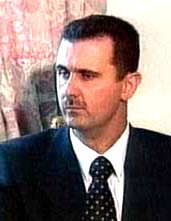|
|
Syria
- Next Target of the Bush Administration?
June 2000 Commentary by Rick Francona
The Syrian People’s Assembly unanimously affirmed the results of the referendum. Bashar was sworn in as Syria’s president on July 17, and the country’s sixteenth head of state. The term of office is seven years. Bi ruh, bi dam…- With breath, with blood… There were similarities to previous Syrian referendums and some new twists. As usual, this was not an election, but a referendum. The electorate was asked if they wanted Bashar to be the president – yes or no. There were no other candidates. In an unusual demonstration, many of the voters pricked their fingers with needles (supplied by Ba’th Party officials at the polls) and made their mark on the ballot in their own blood. This gave life to the words of the common Syrian chant, “With breath, with blood, we sacrifice for ______ (fill in the name of the current leader)….” If past practices were followed, and all indications are that they were, much of the voting was conducted by unofficial proxy. For example, a physician in Damascus related how he had voted. In the morning, he arrived at the hospital to which he was assigned – all doctors work for the Ministry of Health and are assigned to hospitals and clinics. Upon arrival, he was called to the administrator’s office. Flanking the administrator were two Ba’th Party “officials” – more commonly referred to as thugs. One of the officials greeted the doctor and asked if he had voted yet. The doctor replied that he had not, but certainly intended to do so. The official pulled out a completed ballot and offered it to the doctor, explaining that he assumed the doctor wanted to vote “yes” since the doctor was “of course a loyal member of the Party.” The doctor realized that he had no choice and agreed that that was in fact his ballot – his vote was cast. This scenario or something similar was likely repeated thousands of times, maybe hundreds of thousands of times, all over the country. Unfortunately, these actions, coupled with the People’s Assembly’s quick actions – within one hour of Hafiz Al-Asad’s death – to change the constitutional age requirement for the president from 40 to Bashar’s age of 34, only underscore Israeli claims that the Jewish state is the only true democracy in the region. After all, Israelis ask, "Is Syria a monarchy where power passes from father to son, like a king to the crown prince?" Initial Actions During his inaugural address, President Bashar called on the United States to continue its role as a mediator in the Syrian track of the Middle East peace process. He took the opportunity to reiterate Syria’s position, one that has not changed since the process began, that the Golan Heights, captured by Israel in 1967, must be returned to Syria. Syria has always demanded the de facto border be reset as it was on June 4, 1967, one day before the outbreak of hostilities. Surprisingly, the new president directed that pictures of him, as well as banners with slogans of support, be removed. He further stated that he did not want pictures of himself put up all over the country. Visitors to Syria during the presidency of Hafiz Al-Asad remarked that Hafiz’s picture or likeness appeared on virtually every vertical surface in the country. Bashar, educated in Europe, knows the problems Syria faces. It boils down to the economy. He knows he must address Syrian unemployment, believed to be around 20 percent. Additionally, he must remedy the shortfalls in the infrastructure. Even if the economy can create the jobs required for a population who is half under the age of 18, there will not be enough electrical generation capability, roads, etc. to support them. He must also ensure that
he has the support of the Syrian armed forces – the key to power in the
country. He will likely have it initially. The Syrian people right now
want stability. The fact that they do not have a democracy is now secondary.
He has his work cut out
for him.
|
 On
July 10, Lieutenant General Bashar Al-Asad, or “Doctor Bashar” as he is
commonly known in Syria, received 97.29 percent of the votes in a referendum
put to the Syrian electorate. The choice was simple – yes or no to the
presidency of the son of the late Hafiz Al-Asad, who died one month earlier
after ruling Syria for almost 30 years.
On
July 10, Lieutenant General Bashar Al-Asad, or “Doctor Bashar” as he is
commonly known in Syria, received 97.29 percent of the votes in a referendum
put to the Syrian electorate. The choice was simple – yes or no to the
presidency of the son of the late Hafiz Al-Asad, who died one month earlier
after ruling Syria for almost 30 years.